-
Majority of water in Mumbai unsafe to drink
In May 2011 researchers found that one in ten water samples collected in locations across Mumbai, India were unsafe to drink; in some areas 40 percent of the samples collected were contaminated; most alarming was the fact that thirty-six of the water samples tested positive for E.coli bacteria; the local water utility has refused to acknowledge the problem
-
-
Obama official says Yucca Mountain nuclear storage site has no chance
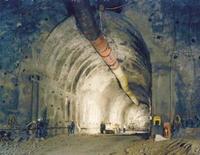
On Monday a senior Department of Energy official said that the long-term nuclear storage facility in Yucca Mountain, Nevada was no longer a viable option; Daniel Poneman, the deputy Energy Secretary, said, “We do not see Yucca Mountain as a solution here. It is time to turn the page and try to find a better set of solutions”; in 2002 Congress approved Yucca Mountain as the designated long term storage site for nuclear waste from atomic reactors in the United States and preparations were under way for the deep underground facility, but in 2010 President Obama withdrew funding for the project
-
-
Record rise in sea level in two millennia
An international research team of scientists has shown that the rate of sea-level rise along the U.S. Atlantic coast is greater now than at any time in the past 2,000 years and that there is a consistent link between changes in global mean surface temperature and sea level
-
-
New tool predicts drought
Knowing when to instigate water saving measures in dry times will be easier from now on, following a breakthrough in drought prediction: an Australian researcher has developed a way to predict droughts six months before they begin
-
-
Nebraska nuclear plant on flood alert
Levees in northern Missouri were failing late Saturday and Sunday as a result of massive release of water from upstream dams; farmland and houses in two Missouri counties — Holt and Atchison — were flooded and residents evacuated; two Nebraska nuclear power plant place on flood alerts
-
-
Strong 1Q growth for U.S. solar power, more expected
The United States showed strong first quarter growth in solar panel capacity, increasing installations by 66 percent; the increase in solar capacity is due largely to falling panel prices and developers taking advantage of government incentives that were set to expire in 2010; analysts expect solar panel growth to increase throughout the year
-
-
China reduces top speed on high-speed rail
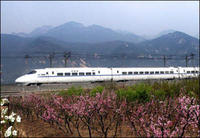
On Monday Chinese officials lowered the top operating speed for its flagship bullet train citing safety concerns; China’s Railway Ministry will now run trains at 155 to 186 miles per hour on the Beijing to Shanghai line instead of 236 miles per hour as was originally planned; the recent announcement comes as part of broader set of changes to the Railway Ministry after Liu Zhijun, the previous minister, was fired for corruption and mismanagement in February
-
-
Era of major volcanic eruptions nears
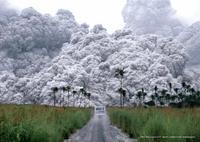
The recent volcanic eruptions in Iceland upset airline bosses and caused a lot of fuss, but they were trivial by comparison with what could happen next, according to Clive Oppenheimer’s new book; 10 percent of the world’s population and at least twelve major cities now located within range of a volcano, so a more accurate perspective is needed on what they can do, so that rational plans can be drawn up in preparation for future events
-
-
Sector Report for Monday, 13 June 2011: Infrastructure protection
This report contains the following stories.
-
-
Fate of chemical security bill uncertain
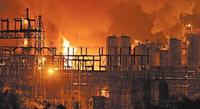
Late last month the House Energy and Commerce Committee approved legislation to extend federal regulations designed to keep chemical plants safe from terrorist attacks, but the bill’s ultimate passage is far from guaranteed; the bill that was recently passed is one of two competing House proposal — the proposals each envisions a different congressional panel monitoring chemical plant safety — and it is unclear which will make it to the floor for debate; in addition, many Democrats and some northeastern Republicans want the extension of the bill to be tied to toughening its language; further to examine what DHS is doing to secure the U.S. chemical facilities from terrorist attack, ASIS is hosting a panel on the Chemical Facility Anti-Terrorism Standards (CFATS) at ASIS annual conference in Orlando, Florida
-
-
Larry Summers calls for $100 billion in infrastructure spending
A former chief White House economic advisor is urging lawmakers to approve $100 billion in additional infrastructure spending to help boost the economy and prevent stagnation; Larry Summers, the former director of the White House National Economic Council for President Obama, wrote that it would be “premature” to limit fiscal support for the economy at the end of 2011
-
-
Truckers push for more highway spending
Last month truckers pushed Congress to increase investments to America’s highway system noting that cargo shipped by trucks was expected to increase sharply over the next decade; the American Trucking Association (ATA) recently predicted that by 2022, there will be an overall increase of 24 percent in freight transportation; of that 24 percent, the trucking industry will see its cargo load increase by 70 percent.
-
-
Montana floods cause $8.6 million in damage to infrastructure
Towns in Montana have been hit particularly hard by floods, causing an estimated $8.6 million in damage to public infrastructure; officials expect that figure to increase in the coming weeks as flooding will continue for some time
-
-
New concrete could increase life of bridges by forty years
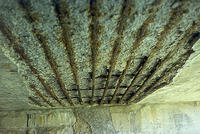
Researchers have developed a new type of concrete that could increase the lifespan of bridges by more than forty years compared to normal strength concrete; the more durable type of concrete minimizes shrinkage, a problem typically found in high-strength concrete; the new concrete is also less likely to crack, which reduces the ability for corrosive materials like chlorides from de-icing salts to seep into the bridge’s internal structure; the new concrete uses a lightweight porous type of sand
-
-
Pakistan charges India with "water terrorism"
India is building dams on three major rivers flowing from the India to Pakistan; an editorial in a leading Pakistani newspaper says that India’s goal is “[to make] Pakistan totally barren,” and that India’s actions amount to water terrorism
-
More headlines
The long view
Falling Space Debris: How High Is the Risk I'll Get Hit?
An International Space Station battery fell back to Earth and, luckily, splashed down harmlessly in the Atlantic. Should we have worried? Space debris reenters our atmosphere every week.
Using Drone Swarms to Fight Forest Fires
Forest fires are becoming increasingly catastrophic across the world, accelerated by climate change. Researchers are using multiple swarms of drones to tackle natural disasters like forest fires.
Strengthening the Grid’s ‘Backbone’ with Hydropower
Argonne-led studies investigate how hydropower could help add more clean energy to the grid, how it generates value as grids add more renewable energy, and how liner technology can improve hydropower efficiency.
LNG Exports Have Had No Impact on Domestic Energy Costs: Analysis
U.S. liquified natural gas (LNG) exports have not had any sustained and significant direct impact on U.S. natural gas prices and have, in fact, spurred production and productivity gains, which contribute to downward pressure on domestic prices.
